
Asia Pacific
07:54, 03-Mar-2019
U.S., ROK to launch new exercise to replace Key Resolve, Foal Eagle drills
Updated
13:53, 03-Mar-2019
CGTN
00:30
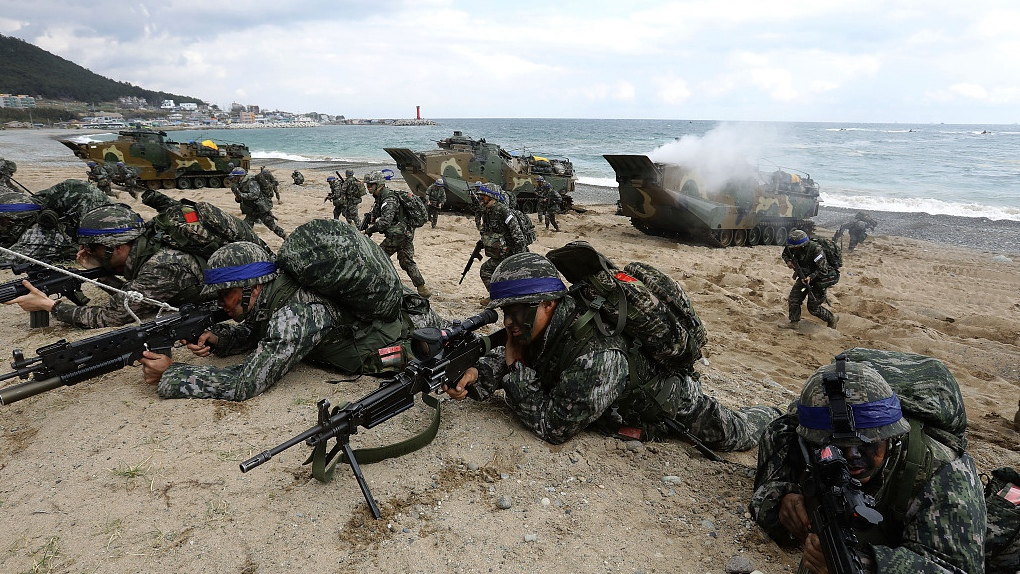
The United States and the Republic of Korea (ROK) will launch the new "Dong Maeng" combined exercise on Monday to replace their springtime "Key Resolve and Foal Eagle" joint military drills, announced the U.S. and ROK on Sunday, according to Yonhap.
The Dong Maeng exercise will last nine days until March 12.
"Dong Maeng, which means alliance in English, has been modified from the previously held spring exercises, Key Resolve and Foal Eagle, and will focus on strategic, operational and tactical aspects of general military operations on the Korean Peninsula," Seoul's Joint Chiefs of Staff and the U.S.-ROK Combined Forces Command said in a joint press release.
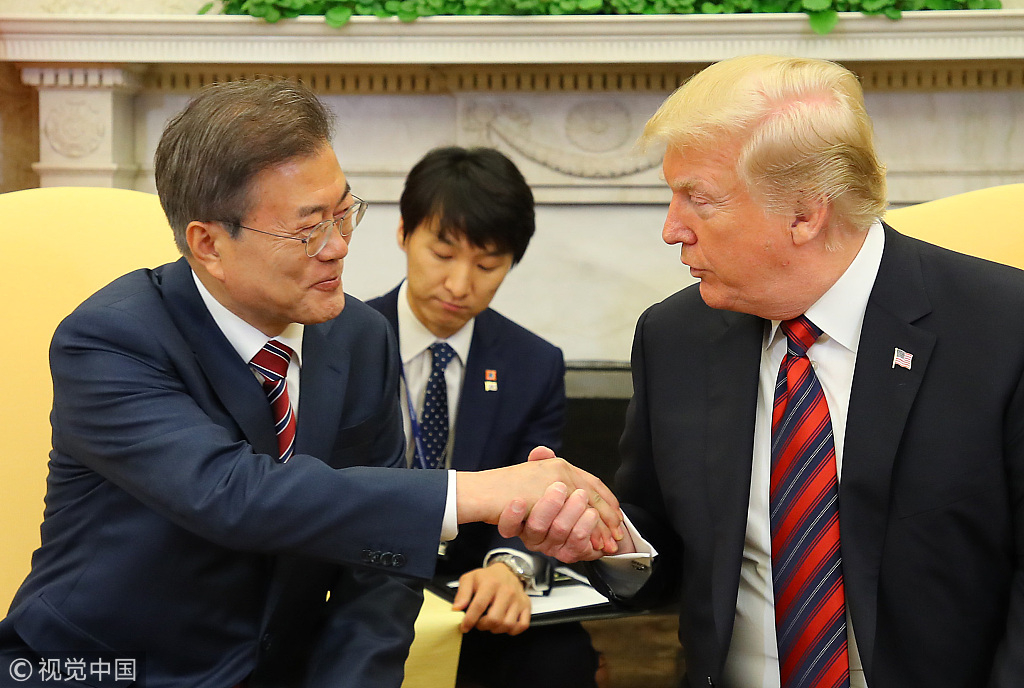
U.S. President Donald Trump (R) shakes hands with ROK President Moon Jae-in at the White House in Washington, U.S., May 22, 2018. /VCG Photo
U.S. President Donald Trump (R) shakes hands with ROK President Moon Jae-in at the White House in Washington, U.S., May 22, 2018. /VCG Photo
The announcement came after an earlier Yonhap report on Sunday that Washington and Seoul have decided to end the Key Resolve and Foal Eagle drills and launch "adjusted outside maneuver trainings and united command exercises," which aims to "keep alive dialogue" with the Democratic People's Republic of Korea (DPRK) while maintaining "military readiness."
A move to 'back diplomatic efforts'
The decision to end the Key Resolve and Foal Eagle drills was made during a phone call between acting U.S. Defense Secretary Patrick Shanahan and ROK Defense Minister Jeong Kyeong-doo on Saturday, two days after U.S. President Donald Trump and DPRK leader Kim Jong Un concluded their summit in Hanoi without a deal.
"Following close coordination, both sides decided to conclude the Key Resolve and Foal Eagle series of exercises," Seoul's defense ministry and Pentagon said in a joint press statement on Sunday.
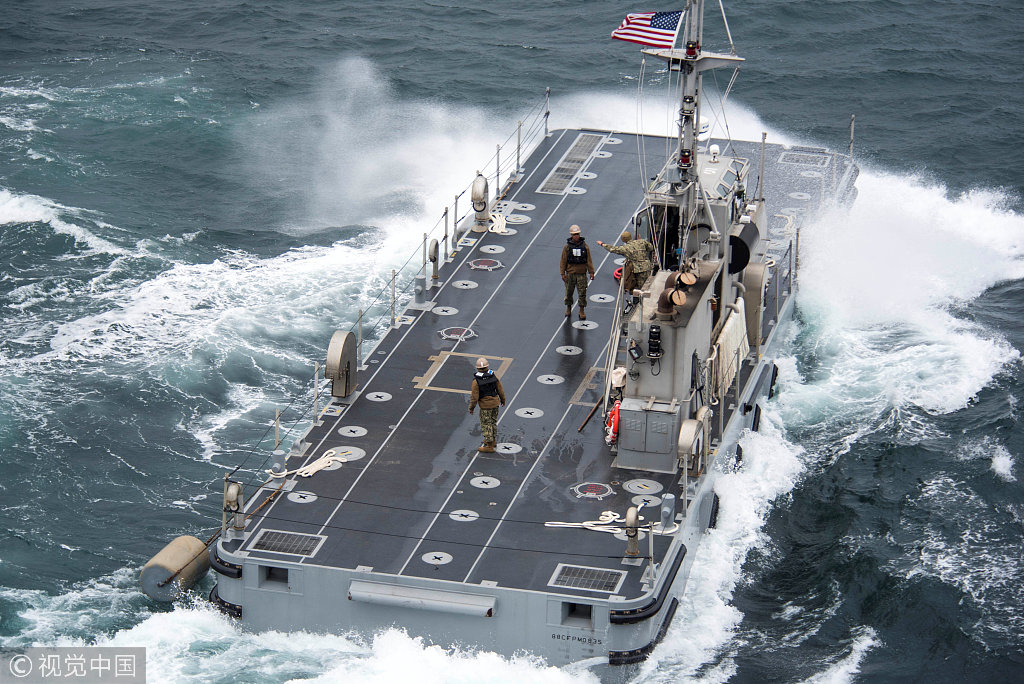
A U.S. Navy ship participate in the Foal Eagle exercise off the coast of Pohang, ROK, April 9, 2017. /VCG Photo
A U.S. Navy ship participate in the Foal Eagle exercise off the coast of Pohang, ROK, April 9, 2017. /VCG Photo
"The minister and secretary made clear that the alliance's decision regarding the adjustment of the exercise and drills reflects both countries' expectation to back diplomatic efforts to reduce tensions and achieve the complete denuclearization of the Korean Peninsula through a final, full verified method," added the statement.
The two allies will instead carry out "adjusted outside maneuver trainings and united command exercises to continue firm military readiness."
Foal Eagle is the biggest of the regular joint exercises held by the allies. In the past, it has involved 200,000 ROK forces and some 30,000 U.S. soldiers.
It is accompanied by Key Resolve, a computer-simulated war game conducted by military commanders which usually begins in March and runs for about 10 days.
Pyongyang has always condemned the drills as provocative rehearsals for invasion.
Trump has also complained over the cost of the drills, but has ruled out withdrawing any of the 28,500 U.S. forces based in the ROK.
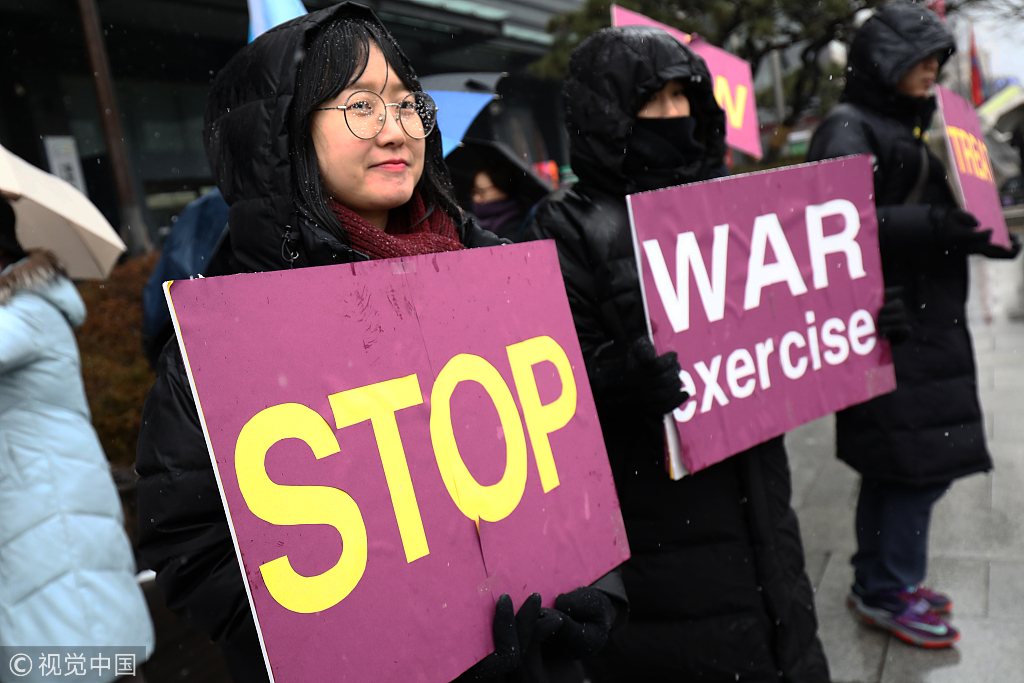
ROK protesters participate in a rally against U.S.-ROK military exercises, near the U.S. embassy in Seoul, ROK, February 19, 2019. /VCG Photo
ROK protesters participate in a rally against U.S.-ROK military exercises, near the U.S. embassy in Seoul, ROK, February 19, 2019. /VCG Photo
Citing a diplomatic source in Seoul, Yonhap reported on Sunday that ROK's chief nuclear envoy will soon head to the U.S. for consultations on the next steps toward the DPRK.
Lee Do-hoon, special representative for Korean Peninsula Peace and Security Affairs, is expected to meet with his American counterpart Stephen Biegun in Washington in the coming days.
The Trump-Kim summit in Vietnam broke down on Thursday due to their differences on sanctions against the DPRK. The U.S. claimed that the DPRK wanted a full lifting of sanctions, while Pyongyang said it only requested a partial removal. Nevertheless, both sides agreed to continue their talks on denuclearization.
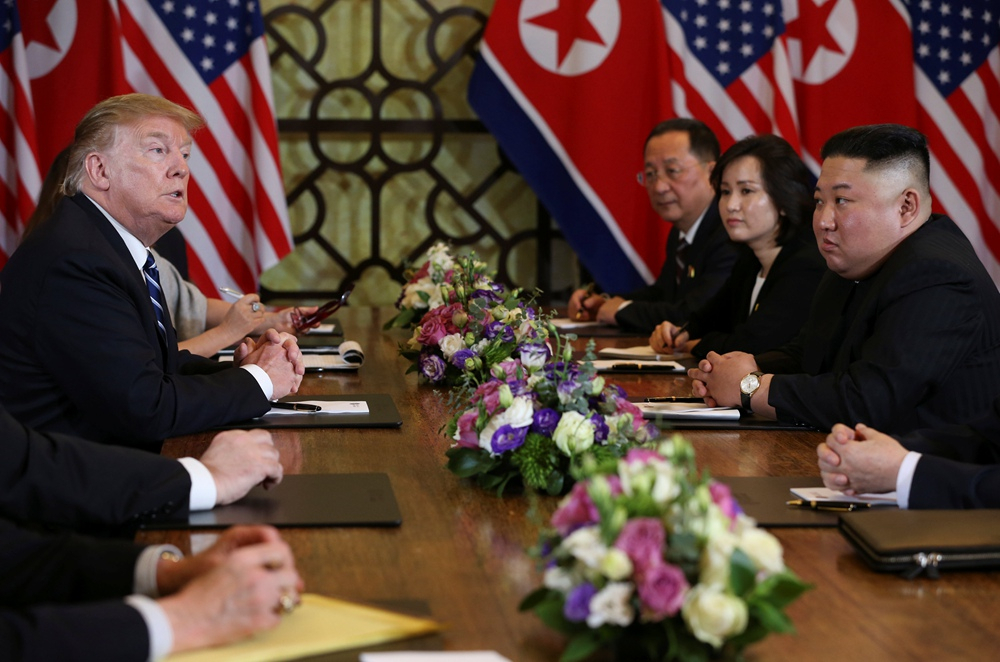
DPRK leader Kim Jong Un (R1) listens as U.S. President Donald Trump (L1) speaks during the extended bilateral meeting during their summit in Hanoi, Vietnam, February 28, 2019. /Reuters Photo
DPRK leader Kim Jong Un (R1) listens as U.S. President Donald Trump (L1) speaks during the extended bilateral meeting during their summit in Hanoi, Vietnam, February 28, 2019. /Reuters Photo
Read more:
At a regular press briefing on Friday, Chinese Foreign Ministry spokesman Lu Kang said: "It has been China's consistent position that the Security Council should, pursuant to provisions of relevant resolutions and taking into account positive progress on the Korean Peninsula, especially DPRK's steps toward denuclearization, begin discussing invoking relevant provisions to modify sanctions according to the principle of synchronized and reciprocal steps."
Beijing has repeatedly urged Washington and Pyongyang to meet each other halfway and accommodate each other's legitimate concerns.
(Cover: ROK marines participate in landing operation during the Foal Eagle joint military exercise with U.S. troops in Pohang, ROK, April 2, 2017. /VCG Photo)

SITEMAP
Copyright © 2018 CGTN. Beijing ICP prepared NO.16065310-3
Copyright © 2018 CGTN. Beijing ICP prepared NO.16065310-3